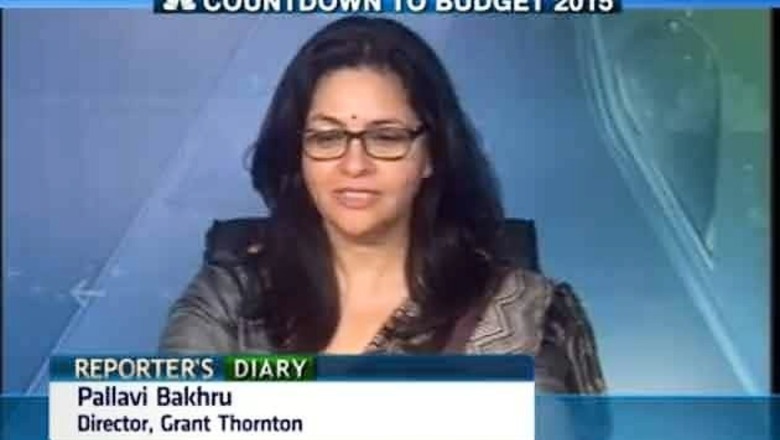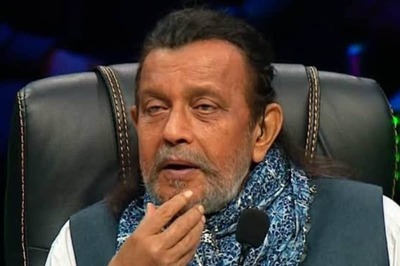
views
It's less than six days to go for the Union Budget and expectations are running high. In an interview to CNBC-TV18, Pallavi Bakhru, director, Grant Thornton, said the euphoria quotient has never been higher.
Discussing the firm's pre-Budget poll on India Inc's expectations from Finance Minister Arun Jaitley, Bakhru said that 56 percent of the respondents see it to be radical Budget.
According to her, people are keen on the roadmap to GST in the indirect tax front, while on direct taxes the majority sees reduction in income tax and higher exemption in the housing loan interest.
Below is the transcript of Pallavi Bakhru's interview with CNBC-TV18's Nayantara Rai:
Nayantara Rai: A lot of people are saying that perhaps this Union Budget is going to be the most important one after 1991. What is your survey showing up; can we expect radical tax reforms?
Pallavi Bakhru: Absolutely, the euphoria quotient has never been higher in terms of expectations and it is on the back of some of the statements that have been made by the Prime Minister and the Finance Minister to say we want more investments and we want India to be open to business and of course the Make in India slogan.
So a large percent of the people we polled, to be precise 56 percent of the people who voted on our poll are actually banking on this reformist tax Budget.
Nayantara Rai: What kind of changes are being envisaged and let us first cover indirect tax and corporate tax?
Pallavi Bakhru: In indirect tax people are more keen to see on what is going to happen on Goods and Services Tax (GST). We know that the GST bill has got the Cabinet Committee approval but nothing more has happened thereafter and if you are really looking at 2016 timeline then people are sort of wondering is every milestone going to be achieved.
So it is nice to see some kind of path being laid out in terms of how that is going to be achieved in terms of rolling out GST. There is no drastic change that people are expecting on rates as far as customs and excise and service tax are concerned because it is a build up to the GST but yes what people are looking for is a lot of rationalisation around some of the procedural issue.
For example there has been a lot of buzz around making excise and service tax which are both central levies, the compliance should be based on similar forms. So somewhere along the way people are anticipating a lot of tinkering to be done to make sure that compliance becomes easier in anticipation of GST.
On the corporate tax side of course things take a different colour. There is this whole conversation around SEZs getting a new lease of life by Minimum Alternate Tax (MAT) being taken away and Dividend Distribution Tax (DDT) being taken away. I don't think people are anticipating a change in rate for corporate tax but yes, there is a lot of clarification that people would like to see in things like indirect transfer. That has been quite a pain point with foreign investors for quite a while.
Nayantara Rai: What is your survey showing as far as personal income tax rates go?
Pallavi Bakhru: There is an overwhelming majority of people who feel there is going to be a reduction in personal tax rates or there is going to be an increase in slab rates. We have had a very overwhelming response on the personal income tax side and there is of course very overwhelming sentiment that the limits under 80C which is the limit for investments is probably going to go up or at least that is the anticipation.
People are expecting that there will be a higher level of interest on housing loan which would now be allowed as a deduction. If you look at the trend when you look at all these exemptions the general trend is that people want more surplus money in their hands and that makes a lot of sense because if you want to sort of really push the economy you would like people to have more disposable income, so that there is more consumption and there is more investment and savings.
Nayantara Rai: In light of the fact that Finance Minister said, yes, this daunting challenge of meeting 4.1 fiscal deficit, how realistic is it. Is there enough headroom for them to actually tinker so much with the personal income tax slabs?
Pallavi Bakhru: It is a balancing act, every Budget is and there is very little expectation for corporate tax rates to be going up really. In fact we were quite surprised that the survey results even showed that MAT; there has been a lot of buzz within the media amongst corporates saying that MAT rates at 18.5 percent are prohibitive and specially if you want to sort of encourage companies to come and invest and specially for manufacturing which are typically capital intensive then 18.5 percent MAT to be paid even when you don't have taxable profit is a little intimidating but surprisingly we find that people are being realistic and they haven't sort of predicted the rate of change as far a corporate tax is concerned or even MAT is concerned.
So I guess somewhere there will be a trade off. There are individuals who definitely feel that there could be lowering of rates, so they could have more consumable income left behind in their hands.



















Comments
0 comment